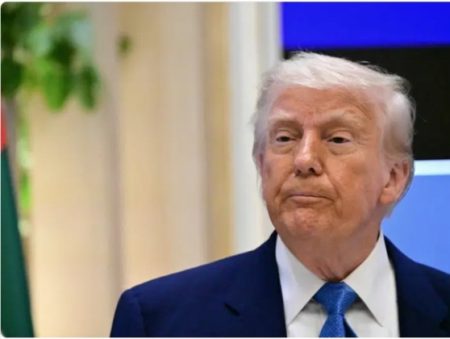The Nigeria Customs Service (NCS) has intercepted 11 containers of contraband items—ranging from unregulated sex-enhancement drugs to expired food and controlled security equipment—valued at a staggering ₦921 billion between January and April 2025 at Apapa Port.
Addressing journalists during a press briefing at the port, the Comptroller-General of Customs, Bashir Adewale Adeniyi, said the seizures were made possible through advanced surveillance, strategic risk assessment, and coordinated inter-agency collaboration. The crackdown aligns with Nigeria’s National Strategic Economic Development Plan and the Presidential Executive Order on Port Operations.
“This operation has yielded a total of 11 seizures, including five 40-foot containers, two 20-foot containers, and four additional intercepts of concealed contraband. The total duty-paid value is ₦921 billion,” Adeniyi disclosed.
Adeniyi expressed deep concern over what he described as a disturbing increase in the importation of unregulated sexual performance enhancers. He revealed that these substances—most of them falsely declared as cosmetics—pose dangerous health risks such as cardiovascular complications and adverse drug interactions, especially when consumed without proper medical supervision.
“Unregulated sexual enhancement drugs constituted the bulk of pharmaceutical seizures. These are highly risky substances when used without medical oversight. Their smuggling under false labels shows a deliberate attempt to bypass safety checks,” he warned.
The Customs chief said about 73.7% of the intercepted pharmaceutical items were not registered with the National Agency for Food and Drug Administration and Control (NAFDAC) and were in violation of Section 28 of the NAFDAC Act. Many were deceitfully labelled as cosmetic powders to evade scrutiny.
In addition to the fake drugs, Customs also confiscated expired food products, including margarine, concealed in two 20-foot containers. Adeniyi described the items as hazardous to public health, adding that they contravened national food safety regulations and pre-shipment inspection requirements.
In a worrying twist, the NCS also intercepted high-risk security equipment at the SIFAX and ENL terminals. Among the items seized were 60 war drones, 53 helicopter drones, and 10 professional FM transceiver walkie-talkies—all lacking end-user certificates from the Office of the National Security Adviser (ONSA), as required by law.
“These are not ordinary consumer items. The importation of such equipment without proper clearance poses a major national security threat,” Adeniyi stated.
The Customs boss said intelligence gathered from the seizures revealed a pattern of transnational smuggling involving mis-declaration of goods, shipment diversification, and use of countries with weak export regulations. He described the criminal activity as a coordinated effort by powerful syndicates operating beyond Nigeria’s borders.
“These seizures are not isolated. They are part of a larger, sophisticated criminal network exploiting Nigeria’s ports. What we’re seeing is deliberate concealment of high-risk cargo to undermine our security and endanger public health,” he added.
Adeniyi emphasized that the NCS is working closely with NAFDAC, the National Drug Law Enforcement Agency (NDLEA), and ONSA under joint enforcement frameworks and Memoranda of Understanding to clamp down on such illegal imports.
Supporting the Customs’ account, NAFDAC’s Director of Ports Inspection, Dr. Olakunle Daniel Olaniran, revealed that many of the intercepted drugs carried fake NAFDAC registration numbers. One particular product—originally meant for coal treatment—was fraudulently branded as a painkiller and bore a registration number belonging to the drug Tramadol.
He also raised alarm over a fake version of Viagra among the seizures. “Viagra should only be used under a doctor’s prescription. Fake variants interacting with other drugs can lead to severe health issues, including death,” he said.
Olaniran added that some of the intercepted drugs were falsely marketed as mental health treatments despite having no legitimate pharmaceutical identity.
With enforcement efforts intensifying, Adeniyi assured Nigerians that the Customs Service remains committed to tightening border security and preventing the entry of dangerous and substandard goods into the country.



![Man is not built to sexually be with one woman’ – 2Face Idibia [VIDEO]](https://kwaraexpress.com/wp-content/uploads/2025/07/IMG_2094-259x300.jpeg)







![Man is not built to sexually be with one woman’ – 2Face Idibia [VIDEO]](https://kwaraexpress.com/wp-content/uploads/2025/07/IMG_2094-450x522.jpeg)

